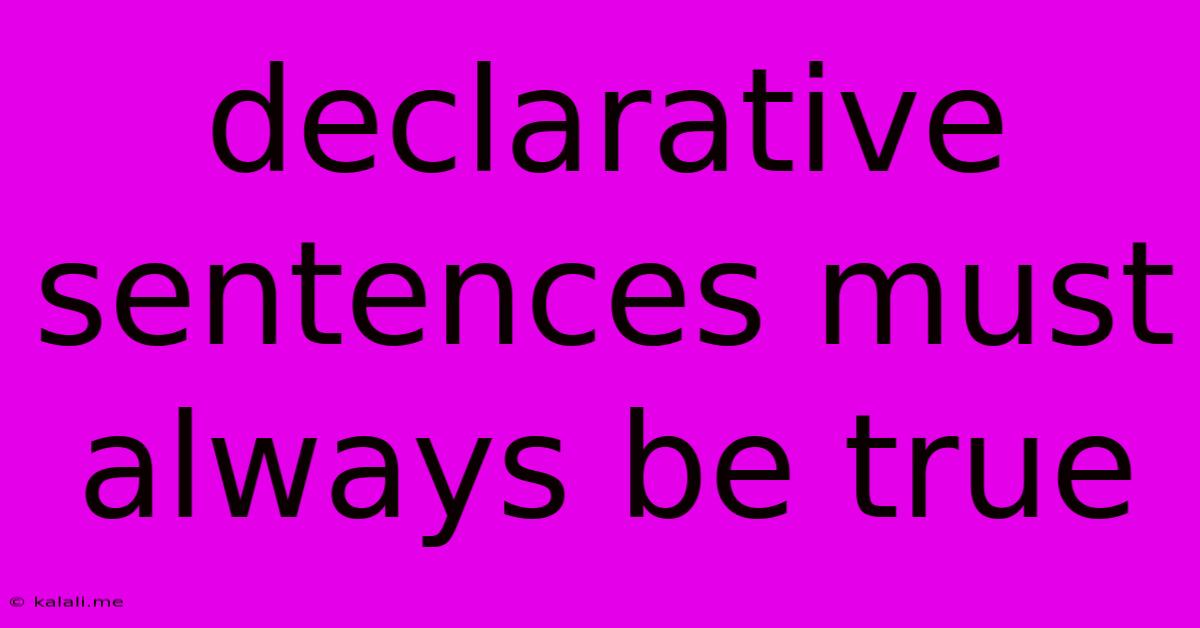Declarative Sentences Must Always Be True
Kalali
Jun 04, 2025 · 3 min read

Table of Contents
Declarative Sentences: Always True? A Deeper Look at Truth and Assertion
Meta Description: This article explores the common misconception that declarative sentences are always true. We delve into the nuances of truth, assertion, and the complexities of language, clarifying the relationship between declarative sentences and factual accuracy.
Declarative sentences, those straightforward statements that make assertions about the world, are often perceived as inherently true. However, this assumption requires a more nuanced understanding. While declarative sentences aim to convey factual information, their truth value is not inherently guaranteed. The relationship between a declarative sentence and truth is far more complex than a simple one-to-one correspondence.
What Makes a Sentence Declarative?
Before diving into the truth value of declarative sentences, let's solidify our understanding of what constitutes a declarative sentence. These sentences are characterized by their assertive nature; they declare or state something. They typically end with a period and aim to convey information, describe a situation, or express a belief. Examples include: "The sky is blue," "Cats are mammals," and "The Earth is round."
The Problem with Absolute Truth
The assertion that declarative sentences must always be true is problematic for several reasons:
-
Subjectivity: Some declarative sentences express opinions or beliefs that are inherently subjective. For instance, "Chocolate is the best flavor" is a declarative sentence, but its truth is dependent on individual preference, not objective reality.
-
Context Dependency: The truth of a declarative sentence can be highly context-dependent. "It's raining" is true only in a specific location and timeframe. What's true in London might be false in Los Angeles simultaneously.
-
Incomplete Information: A declarative sentence might be based on incomplete or inaccurate information. "The population of Canada is 30 million" might have been true at one point, but demographic changes render it potentially false over time.
-
Vagueness and Ambiguity: Sentences with vague or ambiguous terms can lack a definitive truth value. "The movie was good" is subjective and lacks precise criteria for determining its truth.
Assertion vs. Truth
The key distinction lies between assertion and truth. A declarative sentence asserts something to be true; it presents information as factual. However, the accuracy of that assertion is a separate matter. The sentence's truth value must be assessed independently by considering evidence, context, and the nature of the claim being made.
Types of Declarative Sentences and Their Truth Value
It's helpful to categorize declarative sentences to better understand their relationship with truth:
-
Factual Statements: These aim to describe objective reality and can be verified or falsified through evidence. Examples: "Water boils at 100°C at sea level," "The capital of France is Paris." These have a higher likelihood of being true, but still depend on accuracy and context.
-
Opinion Statements: These express subjective beliefs or judgments and are not verifiable in the same way as factual statements. Examples: "This painting is beautiful," "That movie was boring." Their truth value is relative to individual perspectives.
Conclusion: A More Accurate Understanding
Declarative sentences are tools for communication; they assert information but don't inherently guarantee its truth. The truth value of a declarative sentence is determined by its accuracy, the context in which it's uttered, and the nature of the claim itself. It's crucial to approach declarative sentences critically, considering the possibility of subjectivity, ambiguity, and evolving information. Understanding this distinction is key to effective communication and critical thinking.
Latest Posts
Latest Posts
-
Can Fruit Flies Live In The Refrigerator
Jun 06, 2025
-
Can You Damage A File By Not Copying Fully
Jun 06, 2025
-
Sorry I Didnt Know How To Contact You
Jun 06, 2025
-
Absorption Spectra In Films Chemicals And Dyes
Jun 06, 2025
-
Should I Back Up On Battery Power Mac
Jun 06, 2025
Related Post
Thank you for visiting our website which covers about Declarative Sentences Must Always Be True . We hope the information provided has been useful to you. Feel free to contact us if you have any questions or need further assistance. See you next time and don't miss to bookmark.